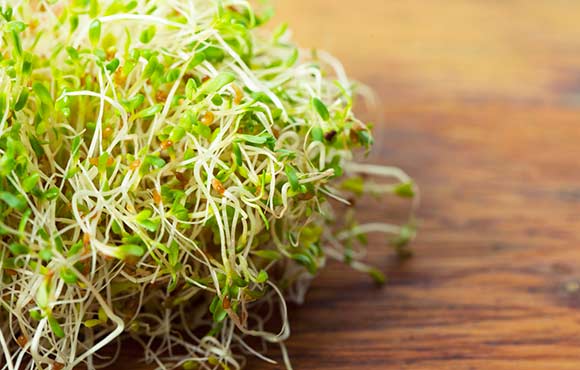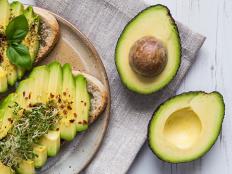The following 10 vegetables will keep you feeling full for a longer period of time and introduce the vitamins and minerals your body needs to function optimally, perform athletically and lose weight.
1. Alfalfa Sprouts
1 of 11
Alfalfa sprouts can easily be added to any sandwich, salad or even soup. You can also grow them at home, which is cheaper and more convenient, and they harvest in only seven days. These sprouts contain an impressive amount of nutrients that include calcium, folic acid, magnesium, phosphorus, potassium and zinc. They also include a full range of vitamins, such as vitamin A, B, C, E and K.
Alfalfa sprouts reduce inflammation, which makes them helpful for people with arthritis or any other inflammatory disease. They also help lower blood pressure and boost the immune system by increasing the activity of our natural killer cells.
2. Watercress
2 of 11
Watercress adds a burst of freshness and flavor to any dish, and it has many disease-prevention properties, particularly for Alzheimer's and osteoporosis. This is because of its high calcium and vitamin K content, which is important for bone formation and strengthening, as well as limiting neurological damage in the brain.
Watercress is also high in beta-carotene and vitamin C, making it a powerful antioxidant. The potassium in watercress also works to control heart rate and blood pressure by reducing the effects of sodium in our diet.
3. Cucumbers
3 of 11
Who doesn't like cucumbers? This popular vegetable is most commonly used in salads and is especially beneficial for skin health, hence why you've probably seen them covering people's eyes at a spa. This is because they help relieve puffiness and darkness around the eyes.
Cucumbers are also a great source of silica, which is a mineral used to strengthen the connective tissue that makes up our skin. Other nutrients include vitamin A and vitamin C, folic acid, magnesium and potassium. They are also high in fiber, which further supports weight loss and intestinal health.
4. Bok Choy
4 of 11
This vegetable has been associated with cancer prevention, particularly lung, colon, prostate and endometrial cancers.
Bok choy is also high in carotenoids, which support our eye health by preventing cataracts and age-related muscular degeneration. Its potassium content lowers high blood pressure, and its low glycemic index helps treat and prevent diabetes.
5. Turnip Greens
5 of 11
Steaming is the best way to preserve nutrition and enjoy the flavor from these vegetables. Turnip greens strongly support our cardiovascular system, protecting against heart attack, heart disease and atherosclerosis. They are an excellent source of folate, which plays a key role in cardiovascular health.
Turnip greens lower cholesterol and have an anti-inflammatory effect, in addition to containing strong antioxidants, lowering the risk of oxidative stress in our cells and aiding in detoxification.
6. Spinach
6 of 11
Popeye had this one right. Not only does spinach help strengthen our muscles, it also helps our eyesight, stabilizes our blood pressure, protects our skin and improves our neurological health. The nutrients in spinach include potassium, manganese, zinc, magnesium, iron and calcium.
The vitamin K content in spinach is also essential to bone health because it prevents excessive activation of osteoclasts (cells that break down bone).
7. Hot Peppers
7 of 11
Want a metabolism boost? Reach for hot peppers. These peppers contain an ingredient called capsaicin, which is responsible for the pepper's kick. Just like the capsaicin heats the inside of your mouth, it can also raise your internal body temperature, which leads to increases in fat- and calorie-burn.
Hot peppers also contain vitamin A and vitamin C, folic acid and plenty of fiber to keep you full.
8. Broccoli
8 of 11
You may have not liked broccoli as a kid, but now is the time to find a taste for this cruciferous vegetable. Among its many health benefits, broccoli is most known for the sulfur containing-compound sulforaphane, which has been shown to lower the risk of cancer, specifically of the lung and colon. Sulforaphane is also what makes it a tad bit bitter.
Broccoli, like the rest of the vegetables on this list, has little fat, carbs or calories (about 30 per half cup), which makes it a vegetable you can fill up on without it ruining your diet.
9. Kale
9 of 11
Kale has only recently become a mainstream vegetable, but now people can't get enough of it. Not only does the vegetable have zero fat, but a single cup has an impressive five grams of fiber, leaving you full without much cost.
Kale is especially high in iron (even outranking more traditional sources like red meat) and vitamin K, which improves everything from your bone health to your ability to fight cancer. Kale also has more calcium than milk, so it's easy to meet your daily calcium requirement without overdoing it on the dairy.
10. Mushrooms
10 of 11
Though technically not a vegetable (it's a fungus), mushrooms are one of the healthiest low-carb foods available. An entire one-cup serving of mushrooms contains just two grams of carbs, one of which is fiber. Mushrooms also are one of the few foods that contain germanium, a mineral that helps the body use oxygen and prevents against the effects of free radicals.
An important note: In order to reap the nutritional benefits of mushrooms, you must cook them first before consuming.







Discuss This Article